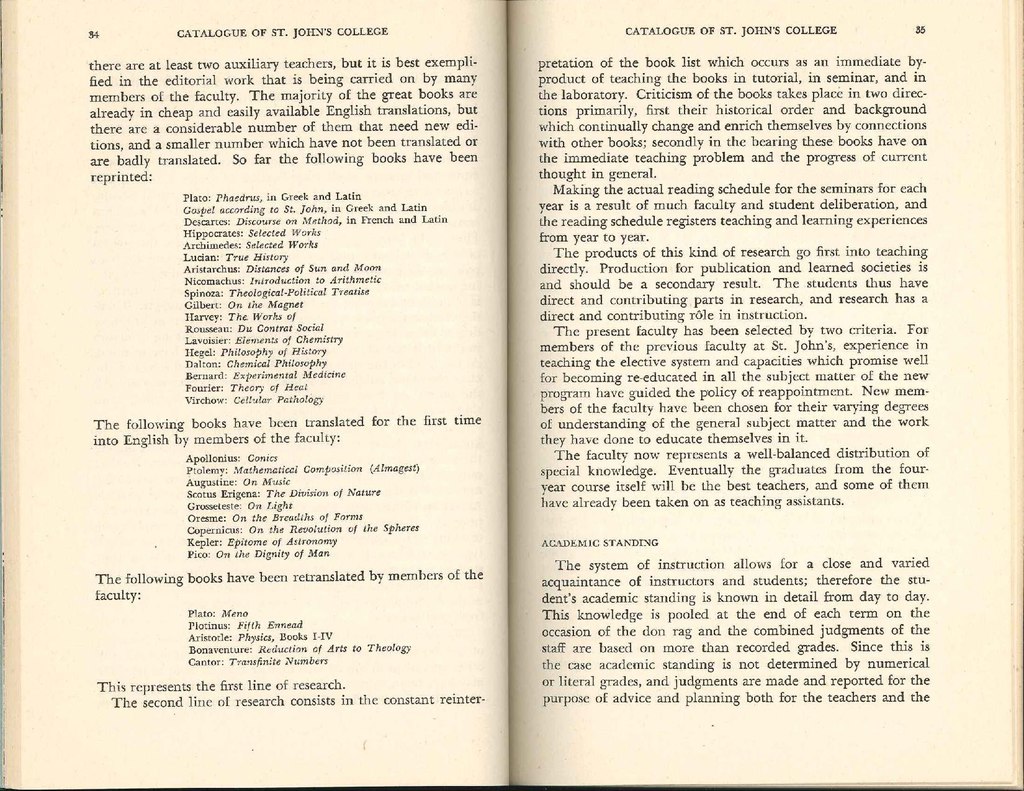there are at least two auxiliary teachers, but it is best exemplified in the editorial work that is being carried on by many members of the faculty. The majority of the great books are already in cheap and easily available English translations, but there are a considerable number of them that need new editions, and a smaller number which have not been translated or are badly translated. So far the following books have been reprinted:
- Plato: Phaedrus, in Greek and Latin
- Gospel according to St. John, in Greek and Latin
- Descartes: Discourse on Method, in French and Latin
- Hippocrates: Selected Works
- Archimedes: Selected Works
- Lucian: True History
- Aristarchus: Distances of Sun and Moon
- Nicomachus: Introduction to Arithmetic
- Spinoza: Theological-Political Treatise
- Gilbert: On the Magnet
- Harvey: The Works of
- Rousseau: Du Contrat Social
- Lavoisier: Elements of Chemistry
- Hegel: Philosophy of History
- Dalton: Chemical Philosophy
- Bernard: Experimental Medicine
- Fourier: Theory of Heat
- Virchow: Cellular Pathology
The following books have been translated for the first time into English by members of the faculty:
- Apollonius: Conics
- Ptolemy: Mathematical Composition (Almagest)
- Augustine: On Music
- Scotus Erigena: The Division of Nature
- Grosseteste: On Light
- Oresme: On the Breadths of Forms
- Copernicus: On the Revolution of the Spheres
- Kepler: Epitome of Astronomy
- Pico: On the Dignity of Man
The following books have been retranslated by members of the faculty:
- Plato: Meno
- Plotinus: Fifth Ennead
- Aristotle: Physics, Books I-IV
- Bonaventure: Reduction of Arts to Theology
- Cantor: Transfinite Numbers
This represents the first line of research.
The second line of research consists in the constant reinterpretation of the book list which occurs as an immediate by-product of teaching the books in tutorial, in seminar, and in the laboratory. Criticism of the books takes place in two directions primarily, first their historical order and background which continually change and enrich themselves by connections with other books; secondly in the bearing these books have on the immediate teaching problem and the progress of current thought in general.
Making the actual reading schedule for the seminars for each year is a result of much faculty and student deliberation, and the reading schedule registers teaching and learning experiences from year to year.
The products of this kind of research go first into teaching directly. Production for publication and learned societies is and should be a secondary result. The students thus have direct and contributing parts in research, and research has a direct and contributing rôle in instruction.
The present faculty has been selected by two criteria. For members of the previous faculty at St. John's, experience in teaching the elective system and capacities which promise well for becoming re-educated in all the subject matter of the new program have guided the policy of reappointment. New members of the faculty have been chosen for their varying degrees of understanding of the general subject matter and the work they have done to educate themselves in it.
The faculty now represents a well-balanced distribution of special knowledge. Eventually the graduates from the four-year course itself will be the best teachers, and some of them have already been taken on as teaching assistants.
academic standing
The system of instruction allows for a close and varied acquaintance of instructors and students; therefore the student's academic standing is known in detail from day to day. This knowledge is pooled at the end of each term on the occasion of the don rag and the combined judgments of the staff are based on more than recorded grades. Since this is the case academic standing is not determined by numerical or literal grades, and judgments are made and reported for the purpose of advice and planning both for the teachers and the
